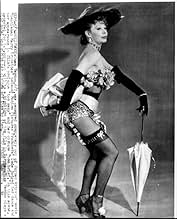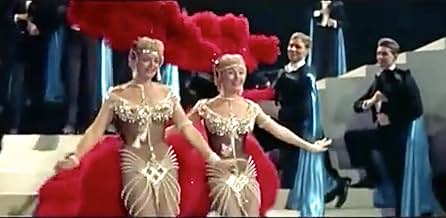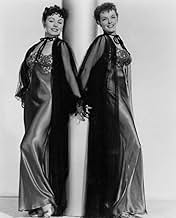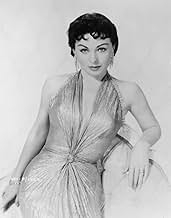अपनी भाषा में प्लॉट जोड़ेंTwo Broadway showgirls who are also sisters are sick and tired of New York, and sick and tired of getting nowhere. They decide to quit Broadway and travel to Paris to try their luck and tale... सभी पढ़ेंTwo Broadway showgirls who are also sisters are sick and tired of New York, and sick and tired of getting nowhere. They decide to quit Broadway and travel to Paris to try their luck and talent there.Two Broadway showgirls who are also sisters are sick and tired of New York, and sick and tired of getting nowhere. They decide to quit Broadway and travel to Paris to try their luck and talent there.
Howard Tracy
- Chauffeur
- (as Edward Tracy)
Carmen Cabeen
- Blonde
- (as Carmen Nesbitt)
फ़ीचर्ड समीक्षाएं
That's the tune you'll be singing after the movie's over... and not because of it's catchy chords and great lyrics, I assure you...
This is the kind of movie that drives anyone to the brink of insanity... for it tries to cover all genres, and it flops in each and every one of them - it's not a good musical... the orchestrations are awkward, far from easy listening, and can manage to ruin even the most enchanting songs ever composed - 'My Funny Valentine', for instance, and 'Ain't Misbehaving', executed on a hilariously ludicrous 'cannibal african tribe' setting (!).
A good comedy...? No, I don't think so... the amusing lines uttered by Jeanne Crain can't solely carry a feature film... by the by, can anyone believe that those legs actually belong to darling youth, 'Margie'...? :)
A good romantic flick? Again, I doubt it... the romantic interludes are ridiculous, featuring Jane "The Girl That Can't Say No" Russell and Scott Brady, and Jeanne "Tough Gal" Crain and Alan "Filthy Rich Hiding Behind A Social Outcast Mask" Young...
A good drama? Only if your notion of drama is reduced to Scott Brady's supreme could shoulders aimed towards Jane Russell... :)
Well... all things considered, this is a plodding, mindless affair that has it's good moments, but is not to be compared to the classic 'Gentleman Prefer Blondes' in any way.
This is the kind of movie that drives anyone to the brink of insanity... for it tries to cover all genres, and it flops in each and every one of them - it's not a good musical... the orchestrations are awkward, far from easy listening, and can manage to ruin even the most enchanting songs ever composed - 'My Funny Valentine', for instance, and 'Ain't Misbehaving', executed on a hilariously ludicrous 'cannibal african tribe' setting (!).
A good comedy...? No, I don't think so... the amusing lines uttered by Jeanne Crain can't solely carry a feature film... by the by, can anyone believe that those legs actually belong to darling youth, 'Margie'...? :)
A good romantic flick? Again, I doubt it... the romantic interludes are ridiculous, featuring Jane "The Girl That Can't Say No" Russell and Scott Brady, and Jeanne "Tough Gal" Crain and Alan "Filthy Rich Hiding Behind A Social Outcast Mask" Young...
A good drama? Only if your notion of drama is reduced to Scott Brady's supreme could shoulders aimed towards Jane Russell... :)
Well... all things considered, this is a plodding, mindless affair that has it's good moments, but is not to be compared to the classic 'Gentleman Prefer Blondes' in any way.
Jane Russell proved to be a delightful musical-comedy performer in the similarly titled "Gentlemen Prefer Blondes"
but, sadly, this film squanders those skills. There is a budget, and nice Paris photography, but the film just doesn't work. Ms. Russell seems to be playing Marilyn Monroe. That leaves nobody to adequately play Jane Russell. Some of the other players are WAY out of their element.
There are several embarrassing scenes; most of all, be warned: there is a musical number where boneheaded African cannibals "cook" the brunettes in a pot, after Alan Young sings in a gorilla suit.
This is an interesting, at times embarrassing, waste of resources.
*** Gentlemen Marry Brunettes (10/29/55) Richard Sale ~ Jane Russell, Jeanne Crain, Alan Young, Scott Brady
There are several embarrassing scenes; most of all, be warned: there is a musical number where boneheaded African cannibals "cook" the brunettes in a pot, after Alan Young sings in a gorilla suit.
This is an interesting, at times embarrassing, waste of resources.
*** Gentlemen Marry Brunettes (10/29/55) Richard Sale ~ Jane Russell, Jeanne Crain, Alan Young, Scott Brady
In this sequel to Gentlemen Prefer Blondes, Jane Russell maintains first billing and takes Jeanne Craine as her sidekick. As the title song tells you, men may go crazy for blondes, but they marry brunettes. Needless to say, Marilyn Monroe is not in this movie.
As is the case with most sequels, this isn't nearly as good as its predecessor. The songs are okay, instead of adorable and catchy, and Jeanne Craine is no Marilyn. I sat through it, because the original is one of my favorite old movies and I wanted to give the sequel a chance. However, if you're looking for a better "sequel" to the 1953 classic, try The French Line. Jane Russell plays a girl from Texas-instead of Arkansas-who goes on an ocean liner to France and tries to dodge smooth players while singing about it. Sounds like a sequel, doesn't it?
As is the case with most sequels, this isn't nearly as good as its predecessor. The songs are okay, instead of adorable and catchy, and Jeanne Craine is no Marilyn. I sat through it, because the original is one of my favorite old movies and I wanted to give the sequel a chance. However, if you're looking for a better "sequel" to the 1953 classic, try The French Line. Jane Russell plays a girl from Texas-instead of Arkansas-who goes on an ocean liner to France and tries to dodge smooth players while singing about it. Sounds like a sequel, doesn't it?
Give this movie a break! It's a spoof of the 50's musicals that were practically unspoofable in the first place. Enormously over-the- top it's nonetheless a great deal of fun; loud, brashy, colorful and vulgar. Travilla's costumes should give you a clue that it wasn't to be taken seriously. Monroe's principal costumer, he purposely spoofed himself with this picture. Relax and enjoy. Enjoy Paris in 1955 and delectable Jane and Jeanne in their final days as major movie stars.
Jane would disappear after 57's Fuzzy Pink Nightgown while Jeanne wasn't far behind in The Joker Is Wild. After that is was A.C. Lyles westerns and TV.
Jane would disappear after 57's Fuzzy Pink Nightgown while Jeanne wasn't far behind in The Joker Is Wild. After that is was A.C. Lyles westerns and TV.
"Gentlemen Marry Brunettes" is sometimes regarded as a sequel to "Gentlemen Prefer Blondes" from two years before, but introduced a completely new set of characters. I have never read either of the Anita Loos novels on which the two films are based, but understand that her "But Gentlemen Marry Brunettes" was indeed a true sequel to its predecessor in that it follows the further adventures of Lorelei Lee and Dorothy Shaw. Neither of these characters appear in the film. The only things the two films share are a broadly similar plot and the presence of Jane Russell as one of the leads.
As in the earlier film, Russell plays an American showgirl, here named Bonnie Jones who performs as part of a double act with her sister Connie. The two sisters decide that their careers on Broadway are going nowhere and that they should try their luck in Paris. Once in the French capital they achieve greater success and fall in love with two young men. And that, more or less, is the plot, although there are also flashbacks featuring another pair of Jones sisters, Mimi and Mitzi (the mother and aunt of Bonnie and Connie) who were the toast of Paris in the twenties.
As in "Gentlemen Prefer Blondes" the emphasis is very much on the female stars; the two male leads, Alan Young and Scott Brady, are even more bland and anonymous than their opposite numbers in the first film. Russell's co-star in "Gentlemen Prefer Blondes" was, of course, the blonde Marilyn Monroe, and an important part of the storyline of that film was that their two characters had not only contrasting looks but also contrasting personalities. Monroe's Lorelei was a quite unashamed gold-digger and Russell's Dorothy, despite a string of cynical wisecracks, was the idealistic "good girl".
Here, Russell is teamed with another brunette, Jeanne Crain. The visual contrast from the earlier film is lost as the two women were similar in looks, although Crain was slightly shorter and less voluptuous. There is an attempt to give their characters different personalities, Bonnie being more flighty and impulsive and Connie more level-headed, but these differences are never brought out well either by the script or by the acting. Russell is not as good here as she was in "Gentlemen Prefer Blondes"; Dorothy seems to have been a character much more suited to her style of acting than is Bonnie. Perhaps, also, after "Blondes" and "The French Line", she was getting fed up with being typecast in scantily-clad showgirl-type roles. As for Crain, she is, quite frankly, a poor substitute for Marilyn.
The film contains some famous songs, although many of these such as "My Funny Valentine" and "Ain't Misbehavin'" have been appropriated (some would say misappropriated) from other contexts. The latter song here suffers from being performed in the context of a bizarre sketch in which Russell and Crain are chased by spear-wielding African cannibal tribesmen and end up in an enormous cooking-pot, a sequence which today seems almost hilariously politically incorrect. Even in the fifties it probably seemed rather off-colour to anyone more sensitive than the average Hollywood film-maker; political correctness is not always a bad thing. The Mimi/Mitzi scenes also get a bit annoying. There is a running joke that the older Jones sisters achieved their immense success despite a total lack of talent, and this is the sort of running joke that quickly outstays its welcome.
As a musical, "Gentlemen Marry Brunettes" contains some attractive music, but its mediocre acting, unmemorable dialogue and virtually non-existent plot means that, as a film, it is in nothing like the same class as its more illustrious predecessor. 5/10, mostly for the music.
As in the earlier film, Russell plays an American showgirl, here named Bonnie Jones who performs as part of a double act with her sister Connie. The two sisters decide that their careers on Broadway are going nowhere and that they should try their luck in Paris. Once in the French capital they achieve greater success and fall in love with two young men. And that, more or less, is the plot, although there are also flashbacks featuring another pair of Jones sisters, Mimi and Mitzi (the mother and aunt of Bonnie and Connie) who were the toast of Paris in the twenties.
As in "Gentlemen Prefer Blondes" the emphasis is very much on the female stars; the two male leads, Alan Young and Scott Brady, are even more bland and anonymous than their opposite numbers in the first film. Russell's co-star in "Gentlemen Prefer Blondes" was, of course, the blonde Marilyn Monroe, and an important part of the storyline of that film was that their two characters had not only contrasting looks but also contrasting personalities. Monroe's Lorelei was a quite unashamed gold-digger and Russell's Dorothy, despite a string of cynical wisecracks, was the idealistic "good girl".
Here, Russell is teamed with another brunette, Jeanne Crain. The visual contrast from the earlier film is lost as the two women were similar in looks, although Crain was slightly shorter and less voluptuous. There is an attempt to give their characters different personalities, Bonnie being more flighty and impulsive and Connie more level-headed, but these differences are never brought out well either by the script or by the acting. Russell is not as good here as she was in "Gentlemen Prefer Blondes"; Dorothy seems to have been a character much more suited to her style of acting than is Bonnie. Perhaps, also, after "Blondes" and "The French Line", she was getting fed up with being typecast in scantily-clad showgirl-type roles. As for Crain, she is, quite frankly, a poor substitute for Marilyn.
The film contains some famous songs, although many of these such as "My Funny Valentine" and "Ain't Misbehavin'" have been appropriated (some would say misappropriated) from other contexts. The latter song here suffers from being performed in the context of a bizarre sketch in which Russell and Crain are chased by spear-wielding African cannibal tribesmen and end up in an enormous cooking-pot, a sequence which today seems almost hilariously politically incorrect. Even in the fifties it probably seemed rather off-colour to anyone more sensitive than the average Hollywood film-maker; political correctness is not always a bad thing. The Mimi/Mitzi scenes also get a bit annoying. There is a running joke that the older Jones sisters achieved their immense success despite a total lack of talent, and this is the sort of running joke that quickly outstays its welcome.
As a musical, "Gentlemen Marry Brunettes" contains some attractive music, but its mediocre acting, unmemorable dialogue and virtually non-existent plot means that, as a film, it is in nothing like the same class as its more illustrious predecessor. 5/10, mostly for the music.
क्या आपको पता है
- ट्रिवियाFox studio head Darryl F. Zanuck had originally assumed the need to dub the singing voices of Jane Russell and Marilyn Monroe in Gentlemen Prefer Blondes (1953) until musical director Lionel Newman famously stitched together a vocal rendition of their opening number from multiple takes. As a back-up plan, an alternate set of recordings was made with Eileen Wilson dubbing Russell's voice, but in the end both ladies sang for themselves, and Russell even released an album of songs on the MGM label. From that point on, Jane Russell always sang in her own movies, including Gentlemen Marry Brunettes (1955), and she would go on to a very successful run on Broadway as Elaine Stritch's replacement in the show "Company" in 1971.
- भाव
Connie Jones: Bad dreams? I'm having nightmares in CinemaScope!
- कनेक्शनFeatured in Legendy mirovogo kino: Jane Russell
- साउंडट्रैकGentlemen Marry Brunettes
Music by Herbert W. Spencer and Earle Hagen
Lyrics by Richard Sale
Performed by Johnny Desmond
टॉप पसंद
रेटिंग देने के लिए साइन-इन करें और वैयक्तिकृत सुझावों के लिए वॉचलिस्ट करें
- How long is Gentlemen Marry Brunettes?Alexa द्वारा संचालित
विवरण
- चलने की अवधि1 घंटा 39 मिनट
- पक्ष अनुपात
- 2.55 : 1
इस पेज में योगदान दें
किसी बदलाव का सुझाव दें या अनुपलब्ध कॉन्टेंट जोड़ें

टॉप गैप
By what name was Gentlemen Marry Brunettes (1955) officially released in India in English?
जवाब































